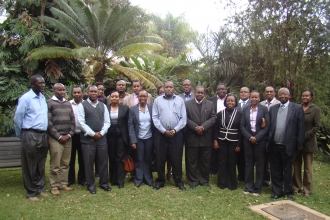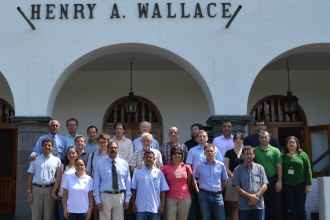
EfD in Kenya Annual Workshop (2013)
EfD-Kenya held its first Annual Workshop on August 7, 2013 at Fairview Hotel in Nairobi. The workshop brought together researchers, policy makers, academia and other stakeholders in the environment…

EfD-Kenya held its first Annual Workshop on August 7, 2013 at Fairview Hotel in Nairobi. The workshop brought together researchers, policy makers, academia and other stakeholders in the environment…
Marine and coastal resources in Vietnam are under increasing threat from human activities (Burke et al. 2002). One way to manage these threats is through Marine Protected Areas (MPAs), which safeguard valuable ecosystems within their confines. Despite the ecological and socio-economic benefits they provide (Whittingham et al. 2003), the management of MPAs is often severely constrained by both a lack of funding and a poor relationship with communities living around (or within) them.
Within the unique wetland area Mpumalanga Lake District lies the site of a proposed, and controversial, opencast coal mine, the Lusthof colliery. It will require a preliminary ‘set-aside’ of about 70
The adoption of certain farm management practices, such as tree planting and soil and water conservation, can reduce exposure to weather shocks. However, in many countries the adoption of such risk mitigating measures is far from complete.
For Acre, in the Brazilian Amazon, we find that protection types with differences in governance, including different constraints on local economic development, also differ in their locations. Taking this into account, we estimate the deforestation impacts of these protection types that feature different levels of restrictions. To avoid bias, we compare these protected locations with unprotected locations that are similar in their characteristics relevant for deforestation.

The activity consisted of presentations and analysis of multiple forest financing schemes with the goal to identify alternative financing sources for sustainable forestry. The development of effective…
Presently, the mountain gorilla in Rwanda, Uganda, and the Democratic Republic of Congo is endangered mainly by poaching and habitat loss. This paper sets out to investigate the possible resolution of poaching involving the local community by using benefit sharing schemes with local communities. Using a bioeconomic model, the paper demonstrates that the current revenue sharing scheme yields suboptimal conservation outcomes.
Empirical analysis of the factors that determine individual compliance with a locally devised set of rules for harvesting and selling marine turtle eggs, as well as for protecting the turtles and their hatchlings. Rules violators receive a monetary penalty, which implies a reduction in the income from sale of eggs. While some individuals do not have income reductions due to infractions, others have reductions of up to 40% of the total income.
Illegal hunting is a threat to wildlife conservation. The motivations for poaching and its possible effects are variable and have not been extensively studied. Applying an economic theoretical-conceptual frame, we analyze the different factors that may determine illegal hunting and discuss some policy implications.